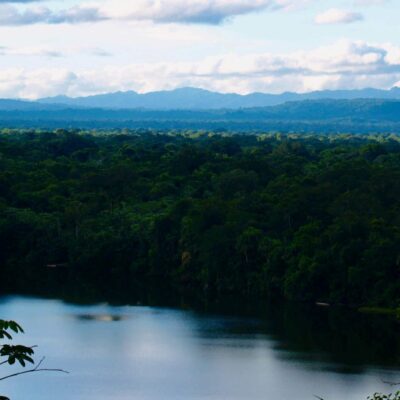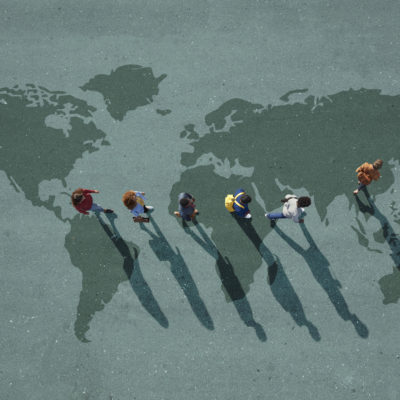 Photo: Unsplash / Tim Mossholder
Photo: Unsplash / Tim Mossholder
This post was first published on EADI Blog: DEBATING DEVELOPMENT RESEARCH.
There is a history to Developmentalism long before the US-American President Truman’s interpretation in his inaugural address of 1949. He then advocated development as an integral part of Western policy embracing the emerging independent states through aid in support of sovereign governance. An embracement, which often turned out to be more of a strangulation than a provision of oxygen to breathe the winds of change as signs of freedom and self-determination to make own choices.
The nature and concept of such development reinforced a paradigm rooting in the era of Enlightenment in central Europe, which paved the way for an expansion into the rest of the world under the flag of early global domination. It equated development with colonialism as a civilising mission and progress. The price was paid not only by those forced under foreign rule and subject to exploitation in most other parts of the world. Such notion of development led to a process of domesticating the local population in the colonizing countries during early industrial capitalism too. Colonisation as “Development” was enforced both at home and abroad.
We deal with Development in the shadow of centuries of a Eurocentric fabric, which managed to obtain global influence pretending to be a universal framework taken for granted. Its success lies in the acceptance and internalisation by people at the receiving end, and the creation of local elites benefitting from practices guided by this model. It reproduced asymmetric power structures and transcended the North-South divide into one of a global system. Such universality is one based on class interests, exclusion, and marginalisation.
As observed by Arturo Escobar:
“Since its inception, ‘development’ has been considered to exist in reality, ‘out there’, solid and material. Development has been taken to be a true descriptor of reality, a neutral language that can be utilized harmlessly and put to different ends according to the political and epistemological orientation of those waging it. … From modernization theory to dependency or world systems; from ‘market-friendly development’ to self-directed, sustainable, or eco-development the qualifiers of the term have multiplied without the term itself having been rendered radically problematic.”
Challenging such dogma means to question the normative legitimacy of a point of departure taken far too long as granted: If internationalism exercises a power of definition over others and imposes values, norms, mindsets, and views on the rest of the world, it is of dubious value. So-called progressive political-philosophical ideologies and perspectives rooted in Western trajectories are by no means secure scaffolding. They all too often lack self-critical reflections questioning the mindset in which they are moulded.
The impact of the era of Enlightenment and the violent expansion of central Europe to the rest of the world is not past. Barbaric acts of destruction, executed with brute force and immense human costs culminating in genocidal forms of elimination for the benefit of the perpetrators, had lasting consequences for indigenous communities and the forms of social reproduction of the survivors. It left not only scars and festering wounds, but also a legacy we ought to engage with. Gurminder Bhambra eloquently outlined this challenge:
“How are we, as academics, scholars, social scientists and historians, complicit in the variable valuation of lives and experiences – at the very least, in our failure adequately to address the omissions and silences in those discourses and understandings that we know to be inadequate and inaccurate? … This requires us – and here the us is social scientists in particular – to be more alert to questions of history and historiography and both to the political economy and demographic diversity of who gets to produce knowledge of our past and the ways in which it shapes the possibilities of the present.”
Being European or Northern or of any other descent does socialise and to a certain extent domesticate us. But it does not pre-determine our worldview and convictions as being cast in stone, even though cultural and religious factors, gender, and pigmentation (and the privileges accompanying the social positioning of many scholars in the Northern hemisphere) should not be dismissed lightly in forming identities and mindsets. Whiteness as much as White supremacy, for that matter, has a factual side anchoring and protecting privileges. But primary experiences and socialization do not exclude or deny processes of learning, changing, adapting, and re-positioning. A continued supremacy of American-European social sciences does not offer scholars any excuses to abstain from joining counter-hegemonic strategies also from within the dominant spheres of influence and knowledge production. True alliances should in principle be able to overcome boundaries and pursue shared values: to question our preconceived ideas and values moulded in Eurocentric and other forms of ethnocentric, in the end anthropocentric socialization and perception, guiding – often unconsciously – our interaction also in scholarly endeavours.
Seeking to replace developmental orthodoxy and fundamentalisms in their diverse forms of articulation, impacting social and political realities in all parts of our world is far more than a cognitive challenge. As Felipe Lagos points out:
“An alternative epistemology cannot solve the structural symbolic violence displayed among worldviews and forms of knowledge by itself; therefore, any dialectical hermeneutic needs to be combined with a critical theory of society and power”.
As the introduction to a Bulletin of the Institute for Development Studies suggested, :
“Development needs to be reframed from narrowly tackling poverty and vulnerability, to navigating complex challenges in ways that reduce inequalities and build more sustainable, inclusive and secure futures for people and societies.
We need a universal framing of development that recognises these challenges as matters for everyone, everywhere, from London to Lagos, from South England to the sub-Sahara, and Brighton as well as Beijing.”
What could be a nobler goal than to promote development understood as to redirect and ultimately stop the race to the wall in a cul-de-sac? A rat race which, based on an anthropocentric obsession, reduces the entirety of our world to the status of an environment suiting some more privileged members of humanity – while ultimately driving not only the extinction of the human species but all life on Earth.
EADI might play a role as mediator and facilitator to provide a forum encouraging robust individual scrutiny among scholars to explore, investigate and question our socialization, mindset, values, and practices. To investigate if these are indeed compatible with the necessary new social contract – and if not, to dare contributing to change by changing our own perceptions and activities in the first place. That is “development” as decolonization in a very fundamental and personal way. It is, at this moment of time, after decades of ignored warnings, a matter of survival. As Su-ming Khoo pointed out:
“Three quarters of a century after the Universal Declaration of Human Rights (UDHR), half a century after the Stockholm Declaration on the human environment, and three decades after the Vienna Declaration recalling indivisible and interdependent rights, human security finds itself in a new “posthuman” context, … The Anthropocene crisis should be a provocation for recapturing an inclusive and equitable, not exclusionary narrative of development. For human security to form the basis for humane policies in the Anthropocene, policies and practices that exemplify the human-environmental solidarity principle of common but differentiated responsibilities should be foremost.”
This brings back the notion of solidarity: in the era of neoliberal dominance in most parts of the world a forgotten but essential ingredient to survival strategies. Empathy and solidarity, not only with other human beings but with all life, must be a guiding principle for Development and therefore also Development Studies. The slogan that “an injury to one is an injury to all” needs to be the moral and ethical compass. As Alfredo Saad-Filho recently stressed , Development and by implication Development Studies should not serve as an apology for maintaining the status quo as untenable, unsustainable trajectory. We owe it to us and our offspring, in the spirit of global solidarity with humanity and nature not to provide notions of Development which serve as “an apology for the status quo, for exploitation, for the reproduction of inequality within and between nations, and for the destruction of the conditions of life on Earth”.
Development needs to translate into the recognition and promotion of a life in dignity and well-being for all. A forthcoming open access volume in the EADI book series challenges global development. Advocating decoloniality, it promotes solidarity and conviviality that work towards achieving social justice. After all, if Development in Development Studies falls short of taking sides with the Wretched of the Earth wherever they are, development fails.
(This is a shortened, modified version of a presentation at the joint EADI-KRTK Conference on 20 April 2023 at the Centre for Economic and Regional Studies in Budapest.)
This article is written by Henning Melber and first published on EADI Blog. Find the full article here.










